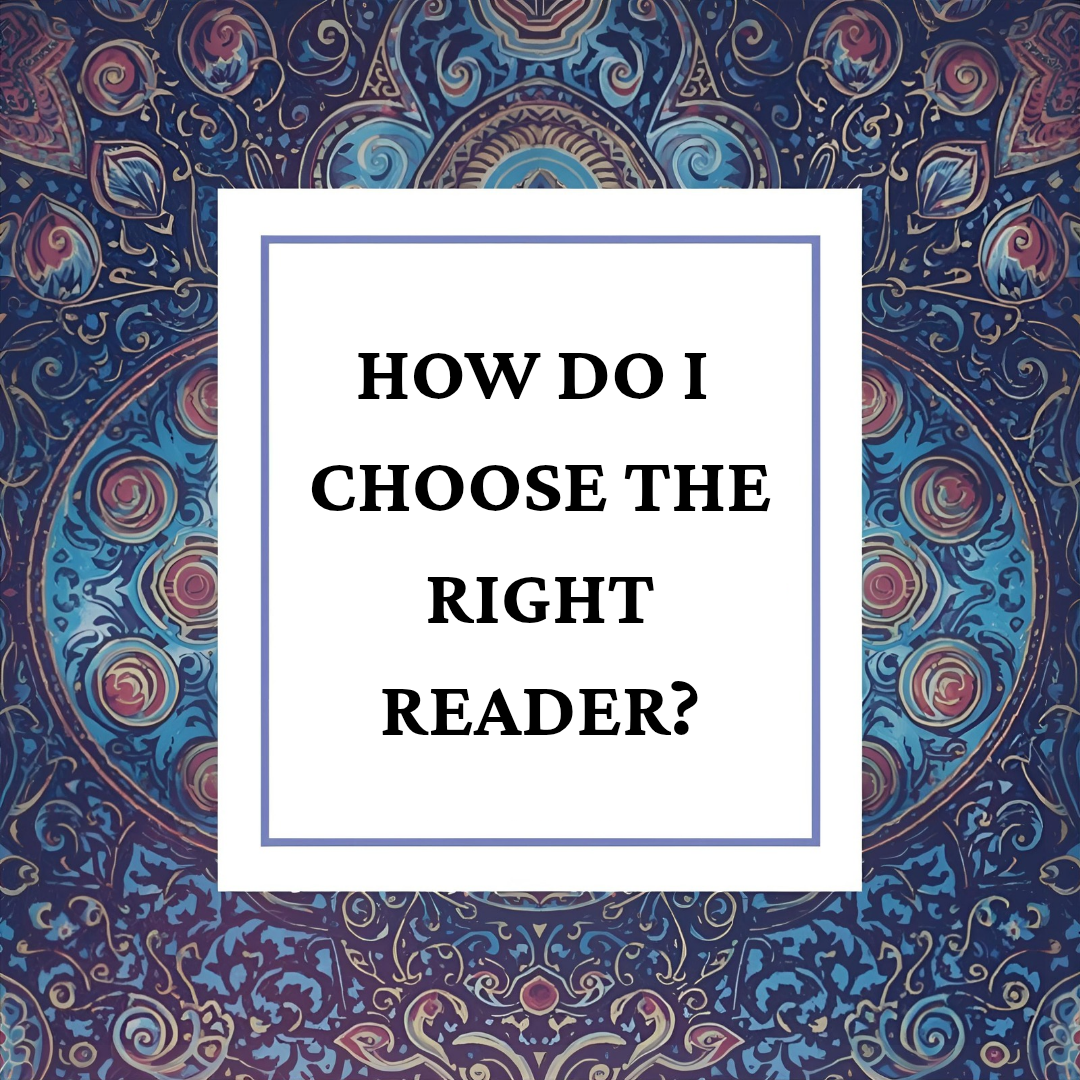
Finding the right reader can feel like a big task. With so many options out there, where do you even start, and how can you avoid scammers and readers who don’t treat their clients well?
The good news is that you don’t need to guess. There are four key things to look at when choosing a reader. Focus on these, and you’ll find it much easier to find someone who’s a great fit for you and your needs.
Let’s break it down.
Decide What Format You’d Like Your Reading to Come In
Most readers offer their services in different ways, so the first thing to consider is how you’d prefer to receive your reading.
1. Live ReadinGs
This is the classic approach and enables you and your chosen reader connect in real time.
Pros:
- Real-time interaction gives you a personal touch. You can ask questions as they come up. If something isn’t clear, you can get it explained right away. The reader can adjust based on your reactions and needs.
- Many people love the energy of live sessions. There’s something special about that instant connection. The reading feels more dynamic and personal when it happens in the moment.
Cons:
- You’ll need to match schedules. This can be tricky if you’re in different time zones. Busy calendars make it even harder to find a time that works for both of you.
2. Pre-Recorded Video ReadinGs
This option gives you total control over when and how you watch (and is one of the two delivery methods I offer my own clients).
- Watch whenever you want. No need to coordinate schedules. Pause when you need to think. Rewatch parts that really matter to you. Take notes without feeling rushed.
- Perfect for busy people. If your schedule changes often, this format removes all the stress. You’re not locked into a specific time slot.
- Keep it forever. Come back to your reading months or years later. Things that didn’t make sense before might click when your life changes.
3. PDF ReadinGs
Some readers provide written reports instead of videos or live calls.
- Usually an affordable choice. Text-based readings often cost the same as recorded video formats (and are sometimes a little cheaper, depending on the reader). You still get detailed insights and guidance.
- Easy to store and reference. Save it on your computer. Print it out. Highlight the important parts. Keep it with your other documents for quick access.
- Great if you prefer reading to watching. Some people take in information better through text. If that’s you, this format might be perfect.
Pick Someone Within Your Budget (But Don’t Be Too Cheap)
Money matters. But the cheapest option isn’t always the smartest choice.
Set Your Budget Range
Think about what you’re willing to spend before you start looking.
This is an investment in yourself. A good reading can help you make better choices. That’s worth something, so don’t treat it like buying a coffee.
Check what others charge. Look at several readers in your area or online. Everyone’s lifestyle and business costs are different, so there will naturally be a range of prices for you to choose from.
Experience affects price. New readers often charge less while building their skills, while seasoned pros with years under their belts and/or higher business expenses are likely to cost more.
Know What You’re Paying For
Price tells you something about what to expect.
- Really cheap prices can be a warning sign. Readers who barely charge anything might rush through your session. They might not have much training or skill yet.
- Higher prices often mean more experience. Popular readers with strong track records charge more. They’ve earned it through consistent results and ongoing learning.
- Compare what’s included. Some readers give you follow-up time or detailed notes. Others just do the basic session. Make sure you’re comparing apples to apples and not apples to oranges.
Focus on Value, Not Just Low Prices
If you’re after an insightful, in-depth reading that helps you to move flats with your life, your goal should be to get good guidance from a trustworthy reader, not to go with the cheapest option by default.
- Mid-tier prices often work best for most people. You’ll find capable readers who take their work seriously. You’re not paying premium rates, but you’re not scraping the bottom of the barrel either.
- Look for deals and packages. Many readers offer discounts for first-timers. Some bundle up multiple sessions at a lower rate, which can be useful if you know that you’ll want several readings over the next few months.
- Your time has value too. A cheap reading that tells you nothing wastes more than money. It costs you the chance to get real help.
Check the Readers’ Reviews
Reviews help you see what others experienced. But you need to read them the right way.
Understand What Reviews Actually Mean
Not all review patterns mean the same thing.
Someone having only a few reviews doesn’t necessarily mean that they’re a bad reader; many new business owners take time to build up a lot of testimonials. If you sell on eBay, Etsy or other places yourself, you’ll know that you might have 50 recent sales with no complaints or returns, but only 15 or 20 people may have bothered to leave a review. It’s the same for readers who are running their own website.
The real issue is if you encounter a reader who has a lot of negative reviews online. Unless you’re dealing with someone who is being maliciously review-bombed by a competitor or bad client (yes, this really happens), then bad reviews should guide you away from working with someone.
And if you can’t find bad reviews and a there are only a handful of testimonials? Try examining patterns in the reviews that you can find. For example, if 3 out of 5 testimonials mention the client feeling satisfaction, being able to make the right decision for the first time in months, and the service being genuinely caring and professional, you’re probably onto a good thing with that reader.
Read Carefully
Don’t just look at the star rating.
Notice the details people share. Reviews that describe actual experiences matter more than “amazing!” with no explanation. What did the reader get right? How did they help?
See how readers handle complaints. Good readers respond to criticism in a professional way. They show they care about improving and making things right.
Check when reviews were posted. Recent reviews show how the reader performs now. People grow and change over time.
Look in Multiple Places
One website doesn’t give you the full picture.
Check several platforms. Look at their website, social media, Google, and any professional sites. This gives you a complete view.
Ask for references if needed. If reviews are sparse, most good readers will connect you with past clients. They should be happy to provide written feedback.
Trust your gut alongside reviews. Sometimes you feel drawn to a reader even with mixed reviews. That instinct might be worth exploring.
Make Sure You Check the Terms and Conditions Before Booking
This boring, but essential, step saves you from surprises later.
Know the Cancellation Rules
Life happens, so you need to know what happens if you can’t make it to your session or want to cancel a recorded of email reading.
Find out the deadline for canceling. Most readers want 24 to 48 hours notice; miss that window and you might lose your money. I, personally, have a fairly strict cancellation and refund policy to protect myself from bad clients. I learned the hard way how important boundaries are in business and have found that the clients who dislike them being in place are usually those who planned to trample on them anyway.
Ask about rescheduling. Some readers let you move your appointment easily once without any issues (like me). Other readers may treat a rescheduling request like a cancellation—make sure that you know which type you’re dealing with.
Understand refund options. What happens if you’re not happy with the reading? Can you get your money back? Under what conditions? The majority of readers will not refund completed readings carried out in good faith, as they cannot recoup their lost time. Buyers remorse isn’t a justifiable reason to request a refund for a completed reading unless there’s something wrong.
For example, if a reader promises a 9-page reading with 5 pictures and you only get 4 pages of writing and a single picture then yes, ask for a redo or a refund. If, however, you got the 9-page reading and 5 clear images, written in a polite and professional tone, then the fact that you just didnt like how the reader interpreted things would be irrelevant to whether or not you should be entitled to a refund.
Confirm What You’re Getting
Make sure you know exactly what’s included in your session.
Check the time limit. How long is your reading? What happens if it goes over? Some readers are strict about time. Others are more flexible.
Check the delivery timescale. Readers are often busy, so a 3 to 5 business day turnaround time isn’t unusual. Many readers offer an express service for a slightly higher price (known in other industries as a “rush fee”).
Ask about recordings or notes. Will you get a copy of your session? Do you get a written summary? Some readers include these, while others charge extra for the time spent preparing an additional pdf of transcript.
Find out about follow-up questions. Can you email later if something comes up? Is there a time limit on this? Will it cost more?
Protect Your Privacy
Your personal information needs to stay safe, so look into the following:
- Ask how they handle your data. What do they do with your birth details? Your questions? Any recordings or notes? A good reader will bear in mind GDPR or other relevant laws that may have an impact on what they do with your data.
- Know who sees your reading. Are your sessions stored somewhere? Could they be used for training? Will everything stay between you and the reader?
- Look for ethical standards. Good readers should clearly state their values. They should promise privacy, respect, and professional behavior and you should avoid those readers who avoid discussing or sharing their stand on reading ethically for others.
Making Your Choice
Choosing a reader doesn’t have to be hard. Start with these four steps.
Pick your format based on your lifestyle and how you learn best. Set a fair budget that values quality over bargain hunting. Read reviews carefully, looking for patterns instead of perfection and make sure you check the fine print to avoid any nasty surprises.
Take your time with this process, as the right reader will be someone who perfectly matches your budget and needs.
When you do your homework first, you’ll set yourself up to receive the kind of readings that change your life, without going over budget or receiving a reading you struggle to understand.


